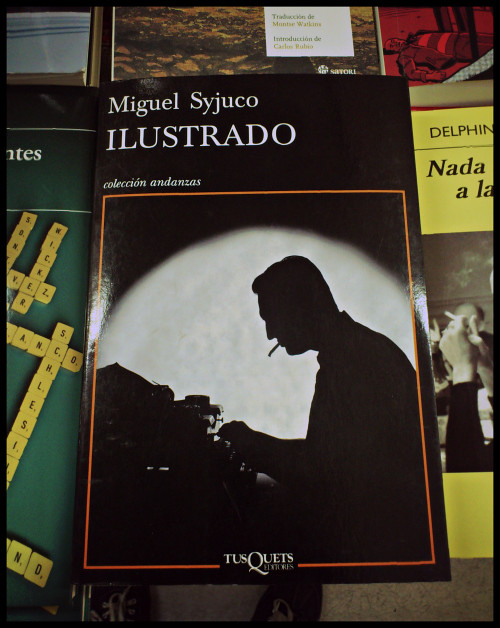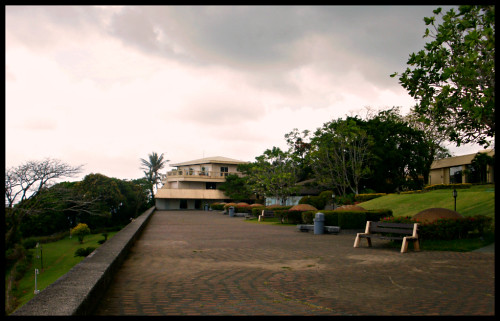I'm so sorry. It happened pretty fast. When C, my boss from Chicago (for whom I had worked only through the Internet), wrote to tell me that I was joining him in Santiago for the rest of the year to participate in some sort of business accelerator program, I had less than a week to get ready. He had booked the flights himself, but actually, up until then, I had no idea that I was going. Or I had the idea that I was not going—especially after weeks of not being able to find flights that worked, that didn't require more visas, that weren't ridiculously expensive. When his E-mail came it thus took me by surprise, which I then expressed tearfully while touching your face and rubbing your chest and stroking your hair.
I hope you will forgive me despite this shy-making business of having told you one thing and doing another. Writing this letter probably won't make our separation any less damnable, but where I am here in Santiago, Chile, approximately 11,000 miles away from Manila, Philippines, my heart longs for you. Begs for you. Pines for you. I have fallen head over heels in love with you, Budoy.
People will say you're an askal, but who cares? Not me. You're not even a year old, yet you are already dearer to me than all the other dogs our family has had in the past. It isn't simply because you are handsome, of course. But do you know that in the right light you kind of look like a Jack Russell? Or so I'm convinced: that's why I couldn't stop taking pictures of you—in the garden, under the white van, in the living room, at the bottom of the staircase.
Before you came into my life, our family had had to deal with the unexpected deaths of a couple of Shih Tzu hybrids:
Martin, whom we had to put down, and, about a year before him,
Mitzie, Martin's mother. You'd think we'd been devastated enough by the loss of these two, but when late last year my Aunt Josie arrived from Pangasinan with you and your sister, there was no question, at least to my mind, about taking you both on. This was at the height of the popularity of a local telenovela on ABS-CBN starring Gerald Anderson, who played the title character named—you guessed it—Budoy. (Rest assured that you are handsomer.) In typical Filipino fashion, your sister was named Buday.
Here's something you might remember from those days: a nasty fight broke out between you and Buday sometime during your first few weeks at home. Lots of squealing and scratching and barking and biting. We tried to stop the fight, even going so far as pouring a bucket of cold water over the two of you, but you wouldn't separate until, finally, you just did. When it was over, Aunt Josie found that she'd gotten a bad gash in her right wrist, which she began to wash with water and rub with garlic. It must have been Budoy, she said. Budoy got me. In fact, it wasn't you. I saw the whole thing. It was Buday, with her sharp fangs, and her uncanny strength, and her hard claws, and her beastly (as opposed to sisterly) qualities, who had struck Aunt Josie, and made you retreat to a corner with a whimper, down and defeated, blood dripping from somewhere—one of your legs, apparently—and sending me to the kitchen to search the cabinet for the Betadine and some cotton balls.
Anyway, this turned out to be the least of your worry-making issues. You're a sickly dog, aren't you? Bless. Last February you had that parasitic infection that caused you to lose the hair on top of your head. (It was nice to watch it since grow back.) Last April you contacted canine distemper, the same viral disease that had killed Martin but which, fortunately, the vet was able to detect early in you. After spending two nights at the clinic in a steel cage with an IV, you seemed to have gotten over the worst of it, and were even barking enthusiastically in agreement, but the morning after your first night back home, when you were heading out to pee, you had to jump over a paved step, and the foreleg that had swollen from the drip burst open. There was blood all over the floor and pathway. I rushed you again to the vet's and by the time we arrived, my arms were covered in your blood, too.
The wounds took a couple of weeks to heal. Then, after deciding that you were finally healthy enough, I scheduled a round of vaccinations (including that for distemper)—your first. You must have hated me at the time, but to clear things up, I did it because I thought it would mean that you were soon going to be less prone to getting sick, that we were both finally going to enjoy more hours of sleep at night, that I was soon going to be able to take you again for a nice, pleasant Sunday walk in the park, and put your stuff in my backpack, and buy us a bottle of water from a concession stand in Luneta, and treat you, if you behaved, to a lick of ice cream. I was wrong. Before I could even plan a trip to the park, you began to lose your hair again. This time it was caused by sarcoptic mange, a kind of mite infestation, from which you have been trying to recover these last eight to ten weeks, including the days before I left. (Thank goodness for the shampoo that at least keeps the mange under control.)
I would wish you were here, Budoy, but as I figured out very quickly you cannot be hairless in Santiago. It is winter; the temperatures go no higher than 15 degrees C; I still shiver in my usual four to five layers of clothes, and I still see vapor coming out of my mouth when I breathe out. The stray dogs on the streets of Santiago—and there are many of them—all have thick hair, or are clothed in used sweaters, and are twice as meaty as you. (I have been told that they are seen by locals as angels of a sort—guiding, guarding, watching over people.) Nevertheless, when I look at them I am reminded of you, whom I miss very much, and would like to cuddle again very soon, in early December to be exact, just before Christmas, it won't be too long, my dear, it won't be too long.
P.S.: Last weekend I went to Valparaíso, a coastal city northeast of Santiago. There I visited one of Pablo Neruda's many houses, where I found a well-preserved poetry book that had fortuitously been opened to "Ode to the Dog" (Oda al Perro):
The dog is asking me a question
and I have no answer.
He dashes through the countryside and asks me
wordlessly,
and his eyes
are two moist question marks, two wet
inquiring flames,
but I do not answer
because I haven’t got the answer.
I have nothing to say….
The dog makes stops,
chases bees,
leaps over restless water,
listens to far-off
barking,
pees on a rock,
and presents me the tip of his snout
as if it were a gift:
it is the freshness of his love,
his message of love.
And he asks me
with both eyes:
why is it daytime? Why does night always fall?
why does spring bring
nothing
in its basket
for wandering dogs
but useless flowers,
flowers and more flowers?
This is how the dog
asks questions
and I do not reply.
Together we roam,
man and dog bound together again
by the bright green morning,
by the provocative empty solitude
in which we alone
exist,
this union of dog and dew
or poet and woods….
and the ancient friendship,
the joy
of being dog or being man
fused
in a single beast
that pads along on
six feet,
wagging
its dew-wet tail.
















